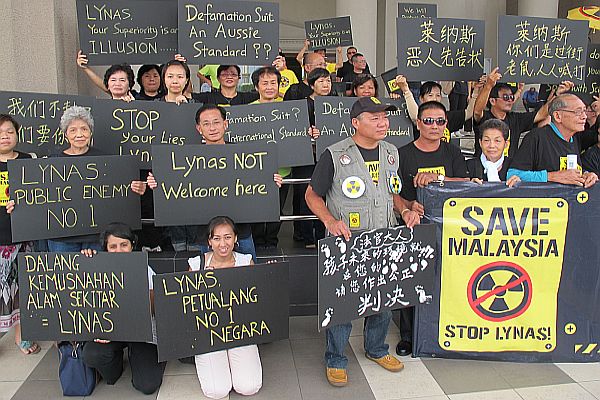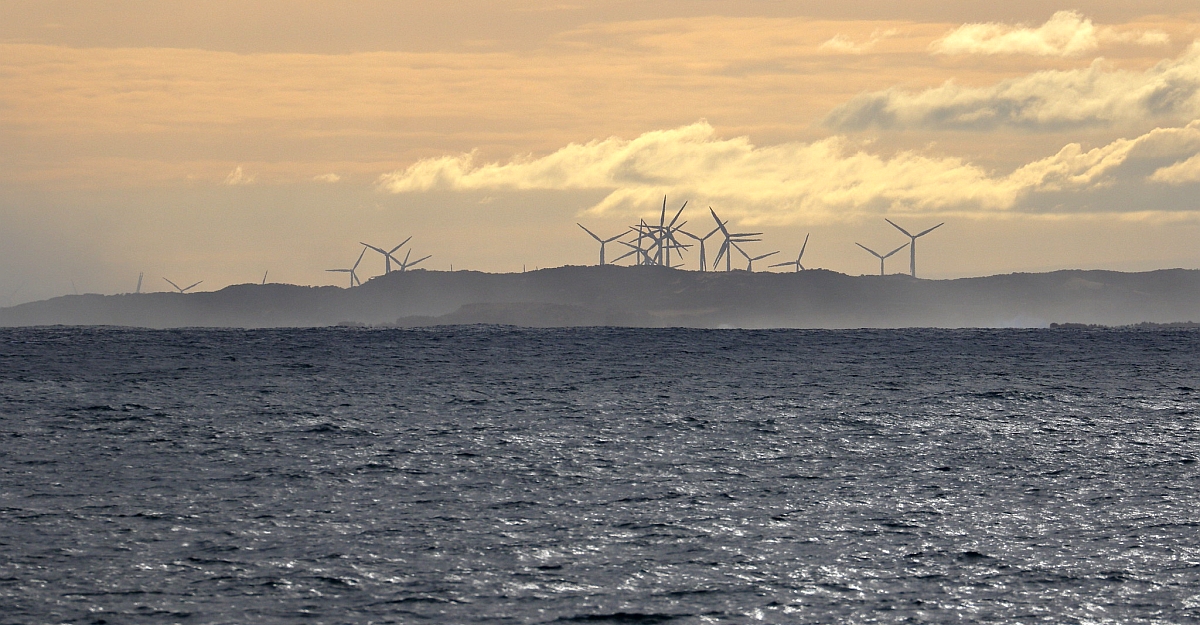On 4 December 2018, the Australian rare earth mining company Lynas suffered a critical setback to its operations in the Malaysian city of Kuantan. The Malaysian minister of energy, science, technology, environment and climate change declared that the mining giant can no longer operate without a plan to safely dispose of its radioactive waste. The announcement came off the back of more than a decade of grassroots activism against the multinational company.
On the day the Government was to announce this decision, I sat in a café in Kuantan with Tan Bun Teet, Chairperson of the Save Malaysia, Stop Lynas group. Mr Tan is a former schoolteacher who was brought out of retirement by the actions of Lynas and now dedicates himself to challenging their threat to his hometown. Listening to Mr Tan’s impassioned concerns about his community and reading the thick dossiers he and his team have compiled over their decade-long campaign, one could not but feel a moral obligation to scrutinise the actions of this Australian company. Whilst the environment movement back home is rightly preoccupied with defending the land of Wangan & Jagalingou from an overseas multinational, we should not forget that it is Australian companies who are the aggressors in many places worldwide – not just Malaysia, but also South Africa and the Philippines to name but two examples.
Lynas operates a rare earth mine in Mt Weld, Western Australia. Rare earth minerals are necessary for the manufacturing of a range of high-tech products, from mobile phones to wind turbines. However, whilst global demand for this raw material is increasing year by year, the supply is decreasing. The rare earth ore lanthanide concentrate extracted at Mt Weld is not processed in Australia but sent to Malaysia for its final extraction in the Lynas Advanced Materials Plant (LAMP) near Kuantan. The reason for locating the plant overseas is that the final extraction process creates waste containing thorium and uranium.
The disposal of this waste is the controversial aspect of Lynas’ operations. The Western Australian Government stated in 2012 they would not accept it back into the country, with then Minister for Mines and Petroleum Norman Moore stating that ‘Australia does not support the importation and storage of other countries’ radioactive waste.’ Precisely why the Kuantan community should be burdened with this waste is the question local activists have been asking.
In Malaysia, Lynas had found a developing country with looser environmental regulations than Australia’s. Along with a 12-year tax break from the Malaysian Government and the strong anti-nuclear campaigns in Australia, this created a powerful incentive for Lynas to establish its processing plant in Kuantan. The company’s local operations consist of what is known as ‘cracking and separation’, an extraction process requiring vast quantities of water and highly concentrated sulphuric acid. The process produces radioactive waste as well as hundreds of thousand of litres of waste water which is discharged directly into the nearby Balok River. The lack of a suitable plan for dealing with the radioactive waste has become the crux of the issue for the campaign against Lynas, and clearly now for the Malaysian government as well.
Currently, Lynas has no Permanent Disposal Facility (PDF) for the radioactive waste produced by its plant. A few hundred thousand tonnes of waste are accumulating in temporary residue storage facilities and have been sitting there since operations began, in 2012. Lynas proposes to use the radioactive waste as one of the ingredients of a soil enhancer for use in agriculture, but the long-term effects of this waste on people’s health and the environment are not exactly known.
The Malaysian government’s demand that Lynas find an alternative way to dispose of the waste – most obviously by building a PDF – has been welcomed by local groups who wish to see the waste stored safely. However, this undertaking appears prohibitively expensive in light of Lynas’ current financial situation.
*
The community campaign against the Lynas plant is almost as old as the company’s plans. When discussions began, in 2008, the Malaysian state of Terengganu rejected the proposal, whereas neighbouring Pahang accepted it. The government offered Lynas a 12-year tax break, wishing to incentivise its economic investment in Malaysia. But the community was not convinced. ‘When we heard about a rare earth plant next to our neighbourhood, we got very nervous,’ explains Tan Bun Teet. This unease is justified, as the memory of Mitsubishi Chemical’s disastrous rare earth refinery plant in Bukit Merah still looms large in people’s minds. The Japanese company closed its Malaysian refinery in 1992 and spent an estimated US$100 million dollars cleaning up the site. Residents blame birth defects and high leukemia rates on the operations of the radioactive plant in their local area.
Perhaps with this historical incident in mind, the government organised six community forums to try to allay the public’s fears concerning the proposed plant. Much to the community’s frustration, Lynas did not attend any of these forums. After only two sessions, the rest were abruptly cancelled. It was around this time that Save Malaysia, Stop Lynas was formed.
The group has employed a variety of strategies over their near-decade of campaigning. It held rallies and public protests, sent petitions and representations to the Australian High Commission and conducted a nation-wide people’s referendum. It travelled to Sydney to protest in front of Lynas’ headquarters, went to Canberra to meet the government of the day, and received support from the Australian Greens. Its appeals to the Australian and Malaysian governments proved ultimately unsuccessful. Over time however, the actions of the group, along with those of Himpunan Hijau (the ‘green assembly’) succeeded in turning the issue into a hot-button political controversy – one which no party aiming to govern in Malaysia could ignore.
Lynas received its initial approval and was granted its tax break under the former Barisan National Government. The opposition party, Pakatan Harapan, recognised the political toxicity of the issue and campaigned against the processing plant. Its election success in Kuantan reflected the popularity of this position, while the decision taken by the Malaysian Government in December is evidence of the strength of the community campaign.
Socialist and environmental groups in Australia have showed solidarity with the anti-Lynas cause, holding rallies and demonstrations at Lynas’ headquarters, then based in Sydney. In 2014, an Australian activist was detained by the Malaysian government along with fifteen local protestors for attending an anti-Lynas rally in Kuantan.
The mining company has resorted to some dirty tactics in its retaliation against the community campaign. Tan Bun Teet and four other activists were sued by Lynas for defamation in June 2012. The case was subsequently dropped but Lynas continued to look for ways of silencing its opponents. They ‘tried to make us look like agents of the Chinese rare earth industry,’ laughs Mr Tan. The mining company has displayed a range of tactics which are not unfamiliar to the Australian environment movement, where resource companies wishing to manipulate a political context to favour their project will practice botched community consultations, make overblown claims about the amount of jobs that will be created, and attempt to buy support with large spending in advertising.
The future for Lynas is not looking hopeful. A day after the recent Government announcement, its shares plummeted by more than 20%. The company has announced that it will be appealing the government’s decision. Its fate now rests with the environment minister. But Tan Bun Teet’s message to Lynas is clear: ‘Don’t burden future generations of this community by leaving behind your radioactive waste!’
Around the world, Australian mineral resource extraction companies are finding their actions challenged by opposition from local communities. The Xolobeni community in South Africa has had a recent win against Australian company Transworld Energy and Mineral Resources, with the High Court ruling that the traditional owners of the land – the Xolobeni people – have a right to free and informed consent before a mining operation can go ahead. In the Phillipines, too, Australian company OceanaGold has been met with organised and widespread opposition to their mining operations in Didipio.
Whilst the governments of these countries might have regulatory frameworks and tax regimes that favour direct foreign investment, communities are asserting that their interests are not identical to those of foreign corporations and are refusing to allow multinationals to treat their countries as resource cash-cows or dumping grounds. With the future of Lynas’ in Malaysia looking uncertain, the tide may be turning against Australian multinationals’ belief that they should have untrammelled access to other people’s land.
Image: A demonstration by Save Malaysia, Stop Lynas outside the Kuala Lumpur high court in 2012.






